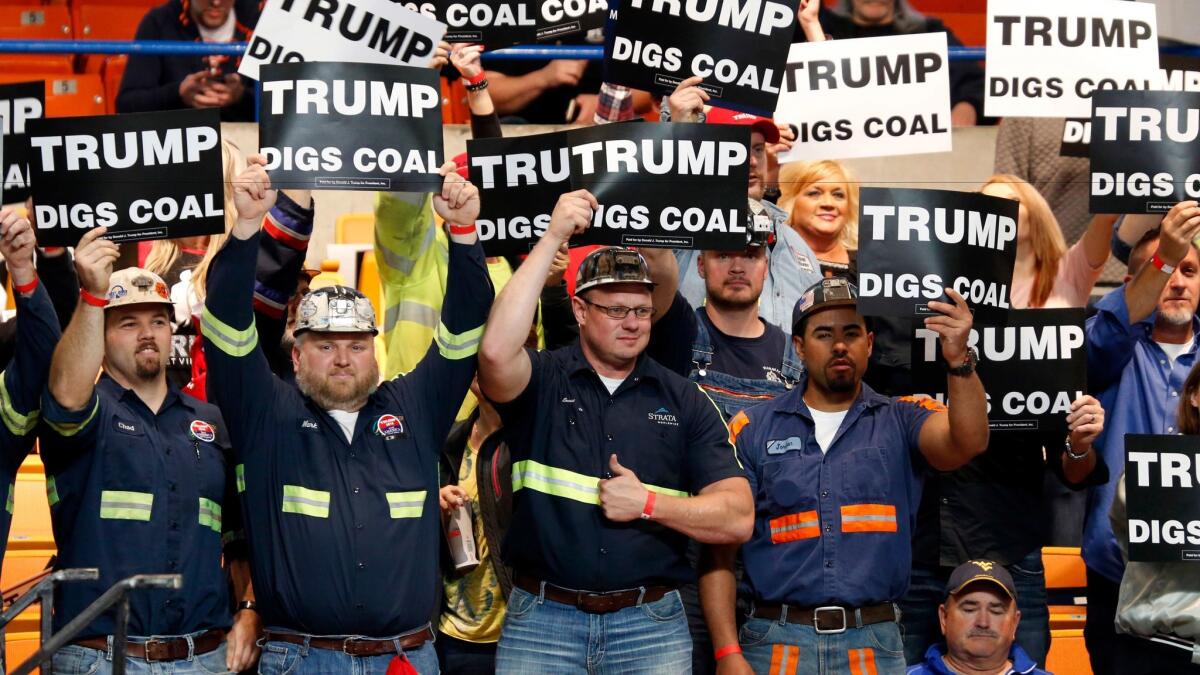Editorial: With Trump’s election, science — and the global environment — will lose

Diplomats and environmental scientists from nearly all the nations of the world are meeting in Marrakech, Morocco, to figure out how best to fulfill the promises made in last December’s Paris climate agreement to limit global warming. But with Tuesday’s election of Donald Trump as president, perhaps the American contingent should simply pack up and come home.
Trump’s refusal to believe the broadly accepted scientific fact that human activity — primarily the burning of fossil fuels — is filling the atmosphere with carbon and other greenhouse gases could have lasting and devastating consequences for the entire world. The overwhelming consensus among scientists is that those emissions are causing global temperatures to rise and are transforming the natural environment in ways that already are having profound negative impacts on plant and animal life. Melting glaciers and the polar ice cap are raising sea levels, and climate patterns are shifting with disastrous effects, from forest die-offs to increased flooding to prolonged droughts. And warmer air and oceans are fueling more intense, powerful storms.
Trump, however, believes it’s all a “hoax.” He’s suggested that American efforts to reduce emissions work to the benefit of China. He has pledged to withdraw from the Paris agreement, to “cancel” it.
In other words, he wants to move us backward even as the United Nations Environment Program reports that the emissions goals in the agreement — designed to keep warming to less than 2 degrees Celsius over pre-industrial era levels — are, if anything, too little, too late. The U.N. program has also said that without immediate and drastic action to curtail carbon emissions by 2030, global temperatures will rise to a level between 2.9 and 3.4 degrees above pre-industrial levels by the end of the century.
Trump has also pledged to scrap the Obama administration’s Clean Power Plan, which was meant to reduce carbon emissions from power plants. His plan, by contrast, is to roll back emissions controls, open more federal lands to mining and oil-and-gas drilling, ease permitting for more pipeline projects and try to revive the coal industry.
To help him accomplish those dangerous and counterproductive ends, Trump has tapped deeply into an anti-climate-change, anti-regulatory crowd of conservatives, beginning with energy-sector lobbyist Mike McKenna (Koch Industries and Halliburton have been among his clients) as head of his energy transition team. To run his transition team for the Environmental Protection Agency — which he has suggested he would either cut back or eliminate — Trump turned to Myron Ebell, a climate-change skeptic and opponent of environmental regulations.
This way disaster lies. And it is unlikely to receive much pushback from a Congress in which Republicans — who generally favor less regulation and oversight of oil and gas production — are firmly in control, and where the only bulwark against rollbacks of environmental law may be Senate filibusters by minority-party Democrats.
Perhaps once he grasps the levers of power, Trump will begin to listen to more learned experts than the lobbyists he has so far turned to for advice. But if not, the most influential nation on the planet — and the second-leading producer of climate-changing emissions after China — could find itself leading the world down a path of even worse environmental degradation and destruction.
The good news, if there is any, is that the rest of the world may not follow. The United States is only one signatory among nearly 200 to the Paris agreement, and as the prospect of a Trump presidency rose, many of those nations rushed to formally adopt the pact, which went into effect four days before the election. If Trump pulls out of the agreement, it will still stand, and the other signatories say they’ll stay the course (though it’ll be tough to meet its international goals with the second-largest emitter opting out). Ironically, by withdrawing, Trump could hand over the mantle of global environmental leadership to China, which has ambitious plans to reduce its emissions.
Trump may not believe the science, but he can’t change it. For the sake of the world, let’s hope he wakes up to reality.
Follow the Opinion section on Twitter @latimesopinion and Facebook
More to Read
A cure for the common opinion
Get thought-provoking perspectives with our weekly newsletter.
You may occasionally receive promotional content from the Los Angeles Times.










